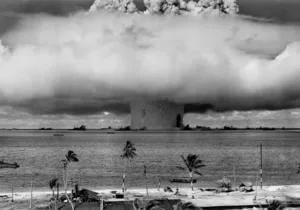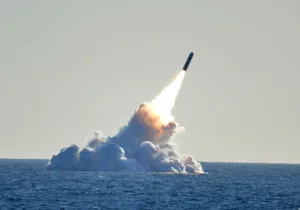Westminster Abbey recently held a commemorative service to mark the fiftieth anniversary of the Royal Navy submariners’ continuous at-sea nuclear deterrent, carrying the Trident nuclear missile system. “For the past 50 years,” noted Reverend John Hall, the dean of Westminster, “Royal Navy submariners have patrolled the oceans and seas of our world, sometimes for many months at a time, burdened with a force able to engender a greater destructive power than has ever been seen on earth.” He continued:
We give thanks for all the thousands of people who have designed, built, supported, and crewed the submarines during these past 50 years and for their families, and we continue to pray for the life and work of the Royal Navy, in particular for its submarine service.
Some find this a rather bizarre point of focus for a thanksgiving service. Reverend Roger Morris, an Anglican anti-nuclear activist, is among them: “The original press release from the Royal Navy spoke of celebrating the ingenuity and skill of those who designed and built the nuclear deterrent… That is something that I cannot condone in a place of worship.”
Morris’ animus against nuclear weapons extends beyond their being celebrated in church. He writes, “The vast majority of [UK Christian] denominations are opposed to nuclear weapons and just last year the Church of England General Synod passed a motion which called on Christians to ‘work tirelessly’ for the eliminations of nuclear weapons ‘due to their indiscriminate and destructive potential.’” Morris contends that because Jesus’ death on the cross ought to “inspire us to seek peace on earth,” weapons with “the capability to indiscriminately kill and destroy on such a massive scale must have no place in our world.”
This is an ongoing debate in the UK, to which Providence contributing editor Nigel Biggar has responded to before (His excellent text can be found here). But a few points ought to be reemphasized.
First, it is silly to suggest, as Morris does, that a weapon with the capability to indiscriminately kill has no place in our world. Any weapon can indiscriminately kill. Indeed, most objects—such as, say, a grilled turkey leg—can indiscriminately kill. This is because, of course, weapons—and roasted meats—have no will of their own (at least not yet). Even weapons designed to be precisely targeted—such as the extraordinary R9X, rightly lauded in Providence recently—come with no guarantees that their human users will target them precisely. Discrimination—distinguishing combatant from non-combatant and intentionally targeting only the former— depends on how weapons are used.
Now, Morris adds the qualifier that some weapons—such as Trident—destroy on a massive scale. Does that distinction matter? It is of course true that nuclear weapons are capable of extraordinary carnage. Any one of those Trident warheads he protests is upward of eight times as powerful as Little Boy, the bomb that killed between 90,000 and 146,000 in Hiroshima. But why this makes it inherently worse than the conventional bombs that killed more than 90,000 in a single day in Tokyo is not immediately clear.
In any case, Morris’ concern about discrimination is reflected in both targeting strategy and weapons development. Nuclear weapons—most especially today’s tactical (lower yield) weapons—can be discriminately deployed against exclusively military targets—such as an enemy’s carrier battle group or submarines, or—as with an earth-penetrating weapon—against a hardened underground bunker or other below-ground military facilities. Contemporary weapons also result in a significantly reduced radiological impact.
It’s also important to understand that the killing of enemy civilians is not necessarily against either international or moral law. Discrimination does not mean civilians must never die. It means only that we do not directly desire that they do. To know they will and to demand they do are different things. This is to say that while killing civilians will always be morally grim, it isn’t always wrong.
If something of a historical aside, we might also note that though it would always be morally evil to intentionally maximize civilian casualties, the only uses of nuclear weapons in human history did not, in fact, attempt to do so. Neither Hiroshima nor Nagasaki were the most populated cities on the list of targeting options. Even on the final short-list, the less-populated city of Kokura was supposed to be hit instead of Nagasaki. But cloud-cover forced the attack to divert to the secondary target.
This question about targeting yields another point. Trident’s detractors should know that the West’s nuclear strategy has moved away from the Cold War’s insane—if effective—policy of mutually assured destruction. Population centers are no longer the focus of attack. In place of this countervalue strategy, the West employs a counterforce strategy, aimed at military objectives and centers of political and martial power. While we might still implicitly threaten populations, in many of today’s conflict scenarios we know this threat doesn’t deter. Tyrants do not always see their people as valuable. Deterrence will only work if what we threaten is cherished.
Nevertheless, while it’s important to point all this out, one thing that is particularly galling is Morris’ misrepresentation of the Westminster service itself. The Westminster dean’s comments quoted above also included this statement:
Today we thank God that this continuous at-sea deterrence, part of a balancing of forces between the most powerful nations on earth, has had the effect of maintaining peace and security between the nations. We pray that the Royal Navy may never be required to deploy these terrible forces in war and that they may continue to deter their use by others.
Detractors ought to be honest enough to acknowledge that what the Westminster observance is celebrating is the fact that Trident’s—and the West’s—nuclear deterrent has worked. It has “had the effect of maintaining peace.” In a letter to the London Times during last year’s controversy, Nigel Biggar wrote that “even the justified use of a nuclear weapon would be very terrible. So we should strive to avoid it, just as we strive to avoid a repeat of the justified war against Hitler, which cost up to 80 million lives, mostly civilian. Such striving is exactly what Britain’s continuous at-sea deterrent has been doing, successfully.” Importantly, it is not clear that anything save the nuclear deterrent would have been equally successful. This matters. Not to split hairs, but twentieth-century history reminds us humanity has been in the business of mass death well before we split atoms. Preventing a recurrence of the twentieth-century body count ought to be important to peacemakers.
If it is important, then deterrents such as the Trident system need to be deployed and maintained, for the sake of peace, even as we do parallel work in other modes of peacebuilding to make their use unnecessary. We needn’t care whether Morris and his fellow anti-nuclear activists learn to be comfortable celebrating the ongoing at-sea deterrent with their fellow Anglicans in Westminster. But, as Biggar concluded, while “we needn’t learn to love Trident, [but] we ought to learn to live with it.”
Marc LiVecche is the executive editor of Providence and the McDonald Visiting Scholar at the McDonald Centre for Theology, Ethics, & Public Life at Christ Church College, Oxford.
Photo Credit: HMS Victorious in the Clyde estuary, Scotland, while on transit to the Clyde Submarine Base Faslane on December 8, 2003. Royal Navy photograph.







 Live in the DC area? Sign-up for Providence's in-person events list!
Live in the DC area? Sign-up for Providence's in-person events list!